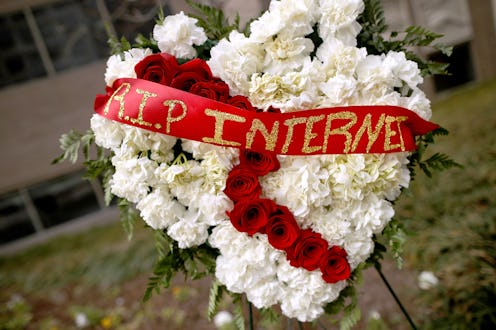News
Say Goodbye To The Free & Open Internet

After months of heated discussion, the results of the net neutrality vote in the Federal Communications Commission are finally in. As expected, the FCC has voted to repeal the net neutrality laws governing the internet. It's a noted victory for internet service providers like Verizon and Comcast who had claimed that net neutrality rules were a roadblock in their process of innovating and developing new technologies.
The FCC is split 3-2 in favor of the Republicans, with FCC chairman Ajit Pai as essentially the nation's leading crusader against net neutrality. The vote, as expected, went along party lines, with the three Republicans voting to repeal and two Democrats voting against the repeal.
Before the vote, the public had overwhelmingly made its choice. A survey run by the University of Maryland found that a whopping 83 percent of Americans, including 75 percent of Republicans, 89 percent of Democrats, and 86 percent of Independents, favored keeping the net neutrality laws intact. Also included in that large percentage of the country were a number of notable internet pioneers like Apple co-founder Steve Wozniak, world wide web inventor Tim Berners-Lee, and Vint Cerf, often called the "father of the internet." They wrote an open letter to the FCC in advance of the vote, saying that “the FCC’s rushed and technically incorrect proposed order to repeal net neutrality protections without any replacement is an imminent threat to the internet we worked so hard to create. It should be stopped.”
One group also calling to put off the vote — albeit for a different reason — were 18 state attorneys who came together to call for a delay after two million comments on the FCC's website regarding net neutrality were found to have been faked. In an announcement on Wednesday, New York Attorney General Eric Schneiderman said,
Millions of fake comments have corrupted the FCC public process—including two million that stole the identities of real people, a crime under New York law. Yet the FCC is moving full steam ahead with a vote based on this corrupted process, while refusing to cooperate with an investigation.
Pai resolved to press on with the vote despite the public outcry. President Trump has not weighed in on the matter any time recently, although he did place the anti-net neutrality Pai in his position as commissioner. Mainstream Republicans such as Senate Majority leader Mitch McConnell have also expressed their support for Pai's move, with McConnell saying that repealing net neutrality could “return the internet to a consumer-driven marketplace free of innovation-stifling regulations.”
Those against repealing net neutrality had argued that taking away the regulations guaranteeing an equal flow of information over the internet would create a fragmented system and would allow the ISPs to essentially block websites or slow down information for people or companies who couldn't pay. The repeal's detractors also argued that getting rid of net neutrality could stifle free speech by allowing ISPs to block information that they didn't want made public or that they for whatever reason deemed inappropriate.
Some also worried that the internet could essentially be divided up into packages, with consumers having to pay more for such popular services as social media or streaming sites or to choose to pay for only the sites that are most important to them. Some ISPs have promised that this will not happen, but now those promises will be put to the test. Their overarching claim seems to be that creating a divided system would be bad for their businesses and their shareholders, but repealing net neutrality does give them the option of making more profit by charging more for businesses to put their own websites in the fast access lane. This likely will not have a huge impact on internet giants like Facebook and Google, who will certainly be able to pay for that for themselves. The companies who are now most at risk are the smaller businesses who simply don't have the budget for that. As the new rules take effect, the country will simply have to see how things play out.
Read more about net neutrality:
What You Should Know About Net Neutrality If Your Nights Consist Of Netflix & Chill
How Net Neutrality Is About To Silence Anyone Who's Not A Rich White Man
How Twitter Is Protesting To Keep The Internet Open To All
These Pros & Cons Of Net Neutrality Are Key To Understanding The Heated Debate